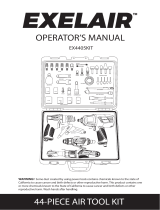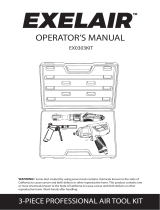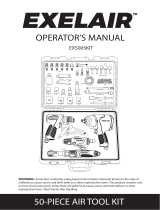Page is loading ...

1/2" AIR IMPACT WRENCH
WARNING! Some dust created by using power tools contains chemicals known to the state of
California to cause cancer and birth defects or other reproductive harm. This product contains one
or more chemicals known to the State of California to cause cancer and birth defects or other
reproductive harm. Wash hands after handling.
OPERATOR’S MANUAL
1/2" AIR IMPACT WRENCH
EX1603KIT

1/2" AIR IMPACT WRENCH
TABLE OF CONTENTS
GENERAL SAFETY RULES.........................................................................................2
AIR SUPPLY..................................................................................................................4
PRODUCT DESCIPTION..............................................................................................5
TECHNICAL SPECIFICATIONS...................................................................................5
ASSEMBLY...................................................................................................................6
OPERATION.................................................................................................................8
TROUBLSHOOTING....................................................................................................9
CARE AND MAINTENACE..........................................................................................9
EXPLODED DIAGRAMS AND PARTS LISTS...........................................................10
WARRANTY................................................................................................................11

1/2" AIR IMPACT WRENCH
GENERAL SAFETY RULES
WARNING!
● Improper operation or maintenance of this tool could result in
personal injury and/or property damage. Read and understand all
warnings and operation instructions before using this tool.
● When using this tool, these basic safety precautions should always
be followed to reduce the risk of personal injury and/or property
damage.
Workplace conditons
1. Always work in a clean, dry, well-ventilated area free of combustible materials.
Never operate the tool near flammable substances such as gasoline, naphtha,
cleaning solvent, etc.
2. Dress properly. Do not wear loose clothing. Tie up or cover long hair, remove any
jewelry, necklaces, etc., which might become caught by the tool.
3. Keep the work area well lit and free of clutter. Slips, trips and falls are major causes
of workplace injury. Be aware of excess air hose left on your walking way or on the
working surface.
4. Ensure that there are no electrical cables, gas pipes, etc., which can cause a
hazard if damaged by use of the tool.
5. Keep visitors a safe distance from the work area. Keep children away.
Use of air tools
1. Stay alert and use common sense. Watch what you are doing. Do not operate the
tool when you are tired or under the influence of alcohol, drugs or medication.
2. Do not overreach. Keep proper footing and balance at all times.
3. Always wear eye protectors which provides protection from flying particles from the
front and side when using the tool. Ear protectors should also be worn.
4. Never use oxygen, carbon dioxide, combustible gases or any other type of bottled
gases as a power source for this tool.
5. Always verify prior to using this tool that the air source has been adjusted to the
rated air pressure range. Never connect to an air source that is capable of exceed-
ing 200psi.
6. Do not connect the air supply hose to the tool with your finger on the trigger.
7. Do not exceed the maximum working pressure 90psi/6.3bar for the tool. Excessive
pressure will reduce the tool life and/or might cause a hazardous situation.
8. Never leave the operating tool unattended. Disconnect the air hose when the tool is
not in use.
9. Keep the air supply hose away from heat, oil and sharp edges.
10. Check the air supply hose for wear and/or leaks before each use. Make sure that
all connections are tight and secure.
11. Do not use the tool for any other than its intended use.
12. Do not carry out any alternations and/or modifications to the tool.
13. Always disconnect the tool from air supply before replacing any accessories,
performing any repair and maintenance, moving to another work area, or passing
the tool to another person.
2

1/2" AIR IMPACT WRENCH
Air impact wrench safety instructions
1. Always use the impact wrench in the manner and for the functions described in this
manual.
2. Always ensure the wrench is not moving and disconnected from the air supply
when changing sockets etc. Only use impact sockets. Do not use standard
sockets.
3. Always finish tightening wheel nuts or engine parts with a torque wrench or suitable
spanner to the correct torque as recommended by the vehicle manufacturer.
4. Always avoid excessive use of the impact wrench. When tightening a nut or bolt,
never allow the wrench to impact more than 8 times. This is to avoid over-tighten-
ing. 3 to 4 impacts is normally sufficient.
5. Always ensure that the socket is correctly installed onto the tool anvil before
starting the tool.
6. Due to the possible presence of asbestos dust from brake linings, always wear
suitable respiratory protection.
7. Never carry the impact wrench by the air supply hose.
8. Always disconnect the tool from the air supply when changing impact sockets or
when the wrench is not required for immediate use in order to avoid accidental
start.
9. Hold the tool correctly. Always use both hands to control the impact wrench.
10. Always ensure that the wrench has come to a complete stop before putting it
down after use.
11. If necessary, use clamps or proper devices to securely fix the workpiece when
installing/tightening or removing/loosening threaded fasteners on the workpiece.
12. For overhead work, wear a safety helmet.
13. Do not discard the safety instructions, give them to the operator.
14. Always store this product in a dry and safe place out of reach of children or
untrained operators.
14. Never use the tool if it is defective, damaged, or operating abnormally.
15. Check for misalignment or binding of moving parts, breakage of parts and any
other condition that affects the tool operation. If damaged, have the tool serviced
before using.
16. Keep working parts of the tool away from hands and body.
17. Do not carry the tool by the air hose.
18. Do not apply excessive force of any kind to the tool. Let the tool perform the work
at the rate as it was designed.
19. Do not remove any labels on the tool. Replace if they become obscured or
damaged.
20. Always maintain the tool with care. Keep it clean for the best and safest perfor-
mance.
21. It is not recommended that quick change couplings should be located directly at
the air inlet, as they add weight and could fail due to vibration.
22. This tool vibrates with use. Continuous operation of this tool might be harmful to
your hands or arms. Stop using the tool if discomfort, a tingling feeling or pain
occurs. Resume work after recovery. Seek medical advice if a serious symptom
occurs.
3

1/2" AIR IMPACT WRENCH
WARNING! Compressed air can be dangerous. Ensure that you
are familiar with all precautions relating to the use of compres-
sors and compressed air supply.
1. Use only clean, dry, regulated compressed air as the power source.
2. Make sure that the air compressor being used for the tool operation supplies the
correct output (CFM).
3. Have the tool in "off" position when connecting the tool to the air supply.
4. Use normal 90psi working pressure for the tool. High pressure and unclean air will
shorten the tool life due to the faster wear and also may create a safety hazard.
5. Drain water from the air compressor tank daily, as well as any condensation in the
air lines. Water in the air line may enter the tool and cause damage to the tool
mechanisms at operation.
6. Clean the tool air inlet screen filter for blockage weekly. Clean if necessary.
7. Usually a 3/8" (inner diameter) air hose is recommended for air supply and airflow
to get the optimum performance of tool.
8. A long air hose (usually over 25 feet) may cause up to 15psi drop in pressure, so
you need to set the output pressure of the air compressor higher to maintain the
required working pressure at the tool.
9. Use proper hoses and fittings. We do not suggest connecting quick change
couplings directly to the tool since they may cause failure due to tool vibration at
operation. Instead, add a lead hose and connect coupling between air supply and
hose whip.
10. Check hoses for wear before each use. Make certain that all connections are in
security.
AIR SUPPLY
Please refer to the typical air system layout recommended below.
6. Shut Off Valve
7. Whip Hose
8. Coupler Body And Connector
9. Drain Daily
10. 1/2" Or Larger Pipe And Fitting
AIR SYSTEM LAYOUT
1. Air Tool
2. Air Hose 3/8" (I.D.)
3. Oiler
4. Pressure Regulator
5. Filter
11. Air Dryer
12. 1" Or Larger Pipe And Fitting
13. Air Compressor
14. Auto Drain
15. Drain Daily
6
9
13
14
15
8
7
12
10
5
4
3
2
11
1
4

1/2" AIR IMPACT WRENCH
TECHNICAL SPECIFICATIONS
SPECIFICATIONS
COMPONENT
1/2"
7,000rpm
250Ft-Lb (340Nm)
1/4" NPT
3/8"
4.5cfm
90psi (6.3bar)
Square drive
Maximum no load speed
Maximum torque
Air inlet
Air hose (inner diameter)
Average air consumption
Working pressure
PRODUCT DESCRIPTION
A
B
F
ED
C
G
DESCRIPTION
QUANTITY
PART
1/2" Air Impact Wrench
Anvil
Trigger
Air Regulating Knob
Air Inlet
F/R Valve Stem
Grease Cap
1
1
1
1
1
1
1
A
B
C
D
E
F
G
5

1/2" AIR IMPACT WRENCH
ASSEMBLY
E
2
3
1. Remove the air inlet protective cap from the
air inlet (E). (See Figure 1)
2. Mount a male plug by hand into the air
inlet (E). (See Figure 2)
3. Place 2 - 3 drops of air tool oil into the male
plug before each use. (See Figure 3)
E
1
NOTE: Use thread sealant tape
on the male plug and tighten it with
a wrench for airtight connection.
Do not overtighten.
6

1/2" AIR IMPACT WRENCH
Impact socket
Extension bar
5
B
4
6
5. If necessary, use the extension bar and
then mount impact socket onto the bar.
(See Figure 5)
6. Connect air supply hose to the male plug.
(See Figure 6)
7. Set the working pressure at 90psi/6.3bar for
best tool performance.
NOTE: Working pressure refers to the
air line pressure set to tool when tool
is under working conditions.
4. Choose the correct impact socket as
needed and mount it onto the anvil (B).
(See Figure 4)
WARNING! Only use impact sockets
that have a RPM and Torque rating
equal to or greater than the tool itself.
7

1/2" AIR IMPACT WRENCH
G
F
C
OPERATION
Forward/Reverse rotation is selected by pushing
the F/R valve stem in the direction shown by the
arrow on the housing of the wrench.
1. How to install/tighten threaded fasteners
Push the F/R valve stem (F) forward as
indicated by "F" marked on the housing.
Press the trigger (C). Then the tool anvil (B)
runs clockwise. (See Figure 7)
2. How to remove/loosen threaded fasteners
Push the F/R valve stem (F) backward as
indicated by "R" marked on the housing.
Press the trigger (C). Then the tool anvil (B)
runs counterclockwise. (See Figure 8)
7
8
9
NOTE: This tool features a power
regulator valve. Press the air
regulating knob (D) downward and
then slowly turn it either clockwise or
counterclockwise to have either of 4
settings pointing at the triangle mark
on the housing. The settings 1, 2, 3,
4 are only for reference and do not
denote a specific power output.
"Setting 1" is the least amount of
power while "Setting 4" is most
amount of power.
NOTE: This tool also features a
grease cap (G) on the tool body.
Remove the screw in the grease cap
with a hex key (not provided). Use a
grease gun (not included) and insert
the gun nozzle into the grease cap.
Several drops of grease are
recommended for lubrication. After
lubrication, replace the screw secure
and tight. This will protect the rotor
gears of motor assembly in good
working condition and extend tool life.
Lubricate the rotor gears once every working day. (See Figure 9)
F
C
8

1/2" AIR IMPACT WRENCH
1. Flush the tool with air-tool oil or gum
solvent.
2. Lubricate the tool.
3. a. Adjust the regulator on the tool to
maximum setting.
b. Adjust the compressor regulator to tool
maximum of 90 PSI/6.3 BAR.
4. Tighten and seal hose fittings if leaks are
found. Use sealing tape.
5. a. Be sure the hose is the proper size.
Long hose or tools using large volumes
of air may require a hose with an I.D. of
1/2 in. or larger depending on the total
length of the hoses.
b. Do not use a multiple number of hoses
connected together with quick-connect
fittings. This causes additional pressure
drops and reduces the tool power.
Directly connect the hoses together.
6. Replace rotor blade.
7. Water in tank; drain tank. (See air
compressor manual). Oil tool and run
until no water is evident. Oil tool again
and run 1-2 seconds.
Tool runs
slowly or will
not operate
1. Grit or gum in tool.
2. No oil in tool.
3. Low air pressure.
4. Air hose leaks.
5. Pressure drops.
6. Worn rotor blade.
7. Moisture blowing
out of tool exhaust.
PROBLEM
TROUBLESHOOTING
CORRECTIVE ACTIONPOSSIBLE CAUSE
CARE AND MAINTENANCE
An in-line oiler is recommended to be installed on air supply line as it increases tool
life and keeps the tool in sustained operation. The in-line oiler should be regularly
checked and filled with air-tool oil. Proper adjustment of the in-line oiler is performed
by placing a sheet of paper next to the tool's exhaust ports and holding the throttle
open approximately 30 seconds. The in-line oiler is properly set when a light stain of
oil collects on the paper. Excessive amounts of oil should be avoided.
In the event that it becomes necessary to store the tool for an extended period of
time, it should receive a generous amount of lubrication at that time. The tool should
be run for approximately 30 seconds to ensure oil has been evenly distributed
throughout the tool. The tool should be stored in a clean and dry environment.
Recommended lubricants: use air-tool oil or any other high-grade turbine oil
containing moisture absorbent, rust inhibitors, metal wetting agents and an EP
(extreme pressure) additive.
Clean the tool all over with a cotton rag after each use. Keep the tool in a dry and
safe place out of reach of children.
9

1/2" AIR IMPACT WRENCH
EXPLODED DIAGRAM AND PARTS LIST
Part No.
Description
Qty.
Part No.
Description
Qty.
1
2
3
4
5
6
7
8
9
10
11
12
13
14
15
16
17
18
19
20
21
Housing*
Valve sleeve*
F/R valve stem - EX1225IW-03
O-ring*
Gasket*
Bolt*
Steel ball*
Spring*
Inlet nipple*
O-ring*
Air flow regulator*
Screw*
Trigger*
Trigger bolt*
Bolt*
Spring*
Screw*
Screw*
Muffler*
Screw*
Axle sleeve*
1
1
1
1
1
1
1
2
1
1
1
1
1
1
1
1
1
1
1
2
1
22
23
24
25
26
27
28
29
30
31
32
33
34
35
36
37
38
39
40
41
42
Anvil*
Hammer cage*
Hammer pin*
Hammer dog*
Drive cam*
Bearing*
Front plate*
Fixing pin*
Rotor blade - EX1225IW-30
Rotor*
Cylinder*
Rear plate*
Fixing pin*
Gasket*
Rear cover*
Cushion*
Cap screw*
Back rubber scuff*
Front rubber scuff*
O-ring*
Ring
1
1
1
1
1
2
1
1
6
1
1
1
1
1
1
4
4
1
1
1
1
1
2
3
4
5
6
7
8
8
9
10
11
12
13
14
15
16
17
18
19
20
21
22
23
24
25
26
27
27
28
29
30
31
32
33
34
35
36
37
38
39
40
42
41
10
*Replacement part not available

1/2" AIR IMPACT WRENCH
For questions about our warranty on this product, contact us at:
MILTON INDUSTRIES, INC.
4500 W. CORTLAND STREET,
CHICAGO, IL 60639
Phone: 855-G04-MILT (855-464-6458)
www.exel-air.com
11
MILTON INDUSTRIES AIR TOOL WARRANTY POLICY
3 YEAR LIMITED WARRANTY
Please visit www.miltonindustries.com to register this product
for the 3-Year limited warranty oered by Milton.
To make any warranty claims or to learn more about the
3 year warranty please visit www.miltonindustries.com
/




